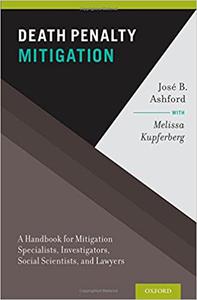
Jose B. Ashford, "Death Penalty Mitigation: A Handbook for Mitigation Specialists, Investigators, Social Scientists, and Lawyers"
English | ISBN: 0195329465 | 2013 | 252 pages | PDF | 2 MB
This book provides an introduction to socio-legal forms of mitigation in capital sentencing. It helps mitigation specialists, defense investigators, social scientists, and lawyers in developing socio-cultural themes of mitigation. It examines scientific formulations, concepts, and frameworks for structuring social history investigations and assessments of moral culpability. A fundamental aim of this handbook was to provide mitigation professionals not only with an understanding of the context of mitigation in criminal justice thinking, but also ways of contextualizing issues of blame and culpability.
Cases are used to illustrate how to identify, evaluate and present mitigation evidence in assessing issues of culpability in the mitigation of punishment in death penalty cases. It also exposes mitigation professionals to recent developments in the social sciences with implications for assessing issues of practical rationality, diminished volition, unfortunate forms of socialization, criminal propensities, socio-cultural deprivation, and gang involvement. These topics are linked with legal and philosophical conceptions of moral culpability that offer mitigation professionals new ways of thinking about both proximal and remote forms of mitigation. These socially oriented lenses, used in examining these concepts and legal issues, offer alternative ways of thinking about issues of capacity, choice and character in assessing diminished forms of moral culpability. The book concludes with recommendations for future research and other strategies for promoting the improvement of practice
in the field of capital mitigation.
Unlike other books on death penalty mitigation, this book examines issues of relevance to social scientists, as well as mental health professionals. In fact, it is one of the only books written on the subject that includes opportunities for the inclusion of expert testimony on socio-legal matters by social criminologists, sociologists, social psychologists, and social workers.
Read more
